Sales meetings: Best practice to run effective sales meetings in 10 minutes

How can you keep your sales team motivated and on track? It’s through regular communication or forums like weekly sales meetings. While these sessions are vital, they can be a source of misery and boredom. However, if you know how to hold effective sales gatherings, your sales reps can benefit more.
The guide will show you how to conduct memorable regular sessions with your sales team. Read on to learn more.
Why are weekly sales meetings important?
As a sales manager, you may think holding weekly sales meetings is time-consuming. Or that these meetings need lots of time, effort, and resources. But wait for a second and consider these brilliant stats.
Continuous training gives 50% higher net sales per employee, Blog.thebrevetgroup.com.
In the long term, well-planned sales meetings can bear fruit. Here are more compelling reasons your sales reps need regular meetings.
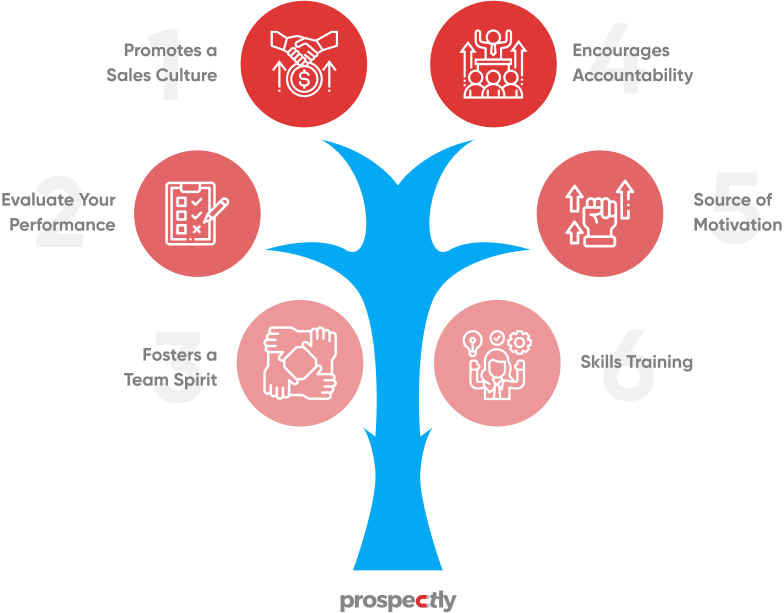
- Promotes a sales culture
Your sales meetings are about sales. Yes, you can indeed talk about other matters. But all of them must evolve around a thriving sales culture.
You can use these meetings to motivate and equip your salespeople to hit more targets.
“A Columbia University study demonstrated that organizations with healthy sales culture experience a mere 13.9% employee job turnover, while job turnover in companies with poor sales culture averages 48.4%,” via LinkedIn.
- Evaluate your performance
How can you know if your sales reps are doing the right thing? It’s through assessing how each sales team member uses your sales techniques. You can also measure the quality of their sales activities, including meetings, calls, and networking.
- Fosters a team spirit
Your company can achieve more if sales reps and other departments work as a team. Sales meetings are perfect for encouraging communication amongst all the stakeholders.
- Encourages accountability
You can examine sales numbers to assess your company’s results. The more you discuss the stats with your team, the more salespeople see the connection between revenue and performance.
Numbers make everyone accountable for their outcome.
- Source of motivation
Now and then, your salespeople need some doses of motivation. Selling isn’t easy. As a result, sales managers can use sales meetings to create healthy pressure and competition.
“Companies that motivate their employees regularly see a 27% rise in profits. This is coupled with a 50% increase in sales, 38% above-average productivity, and a 50% increase in customer loyalty levels.”
Peers can push each other to excel and close more deals.
- Skills training
Training equips your team with relevant skills and new trends in selling. It makes reps better at lead generation, sales prospecting, closing deals, and increasing sales.
But it’s crucial to align your training with what your reps need. Where do they lack in the sales pipeline stages?
“26% of sales representatives claim that their sales training has a minor to no effect,” via Taskdrive.com. Check your sales numbers to figure out what you must improve.
You can start your weekly meetings with confidence with all these great benefits. But what are the objectives of an effective meeting?
John Treace, Founder of JR Treace & Associates, stresses five crucial things sales managers need to bear in mind. He says that if sales leadership considers these topics, it can have productive sales meetings.
Sales meeting topics
- Plenty of money

- Tell it like it is
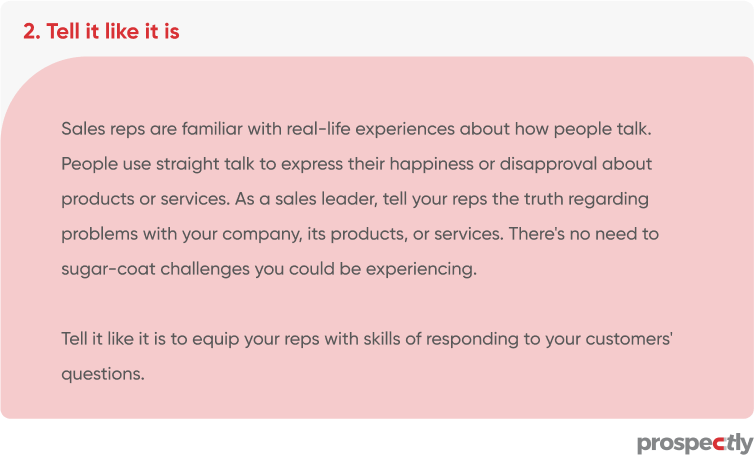
- Time is precious

- Sales reps are social beings

- Recognition
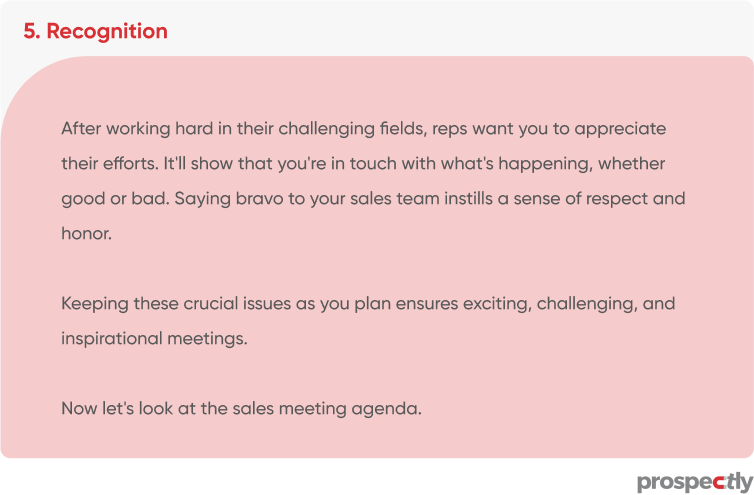
The sales meeting agenda
You’re thinking of conducting a meeting, and you wonder what items to include in your plan. Darn Martell, CEO, Serial Entrepreneur, Investor & Creator of SaaS Academy, suggests the following for your weekly sales meeting.
He says that your meeting must have cadence and structure. Check out the example below.
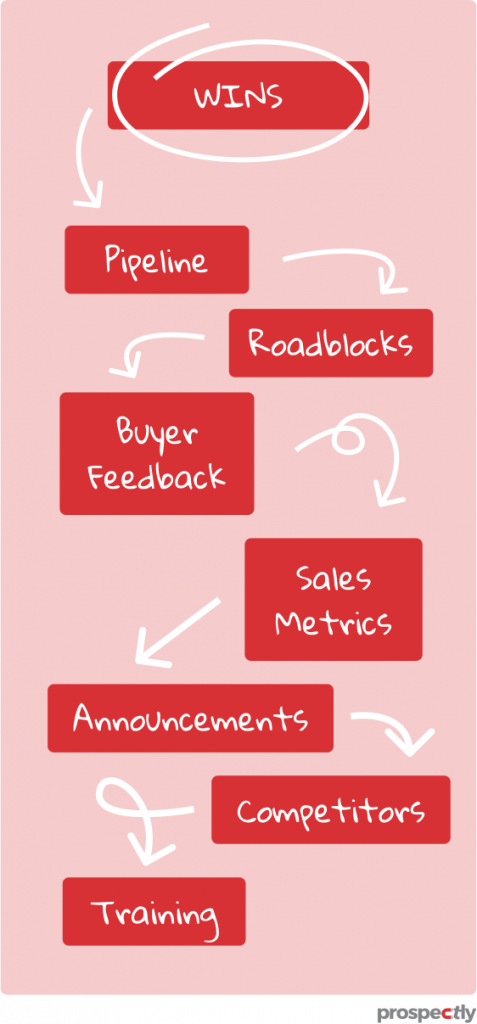
- Wins
At the top of the agenda of this structure is celebrating wins. The idea is to start with success stories to motivate your sales team. You can allocate three minutes for this activity.
The pro side of this is that it challenges and inspires low performers. Reps with wins can share how they closed a big deal. Even high performers can feel empowered to do more.
- Pipeline
The next crucial agenda item is dealing with your pipeline. You could be using some software, like Salesforce or HubSpot, to manage your pipeline. Or a spreadsheet.
Whatever the case, you need to review the pipeline stages and the activities that go with them. (Pipeline stages-anchor text) You should find out who’s lagging in follow-ups for each stage and closing deals.
Knowing who is underperforming will help you address the challenges there and then. You can nip them in the bud and help your reps get back on track to smash their sales targets.
It’ll also ensure that they follow a proven sales approach that bears results. They become consistent, too.
- Roadblocks
For this item, you want reps to tell you the challenges they experience in their field. What forces are acting against their success or efforts? The process is critical as it allows you to offer suggestions to deal with the roadblocks.
You can recommend some books or plan a separate sales training session to deal with the obstacles.
- Buyer Feedback
The purpose of this exercise is to understand what your customers say about your products or services. Which reps are having conversations with people? What feedback can you incorporate into your sales process?
Customers’ responses will help your business match your solutions with your buyers’ needs.
- Sales Metrics
To gauge your performance, you can discuss some metrics with your sales reps. You can also assess each sales team member’s daily, weekly, or monthly quota. Determine whether your team is on track and has enough resources to meet its goals.
Follow-ups are another example of a metric you can measure. You can also consider:
Closed deals and lost ones: Ask each rep to provide more info on the won deals for the past week. The details should include the value of each deal and all sales put together.
Deal activities: Request each rep update the team on sales activities pushing leads to the next deal stage. One example might be several emails leading to a demo.
Conversion rates: They show how your reps have been able to move prospects down the sales funnel. Have emails been influential in leading potential customers to buyers, for example? Greg Winteregg, CEO of Matterhorn Business Development, suggests that every team member should have stats representing their production. They must use a line graph to represent their numbers and bring them along to the meeting.
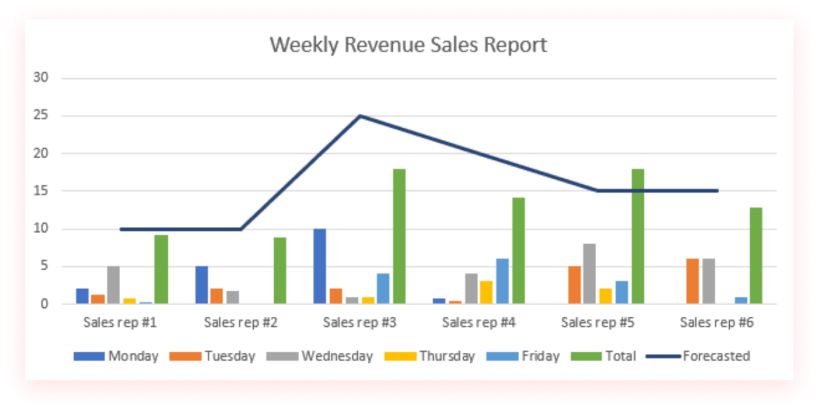
The graph shows stats for several reps and combines a bar and a line graph. The diagrams for each representative in your team meetings don’t have to be as detailed as the example. The charts should be simple.
To ensure everyone cooperates, provide your reps with graph paper, rulers, and pencils. Make graphs mandatory in every sales meeting. The sales manager should go over the chart with each representative.
Each team member needs to explain in the meeting how they’ll improve a falling graph or keep a rising one in that range. Every individual will know what they’ve to do in the coming week to hit their goals.
According to Greg, graphs challenge each team member to improve after every meeting. That’s because nobody would want to show a dropping graph.
You also encourage everyone to take responsibility for their statistics.
- Announcements
It’s critical to keep your reps updated with the latest developments in your company. That’s because salespeople are always busy chasing after prospects and sales targets. They may not be aware of what’s happening in your organization.
You can also talk about the sales team and the product roadmap. Consider bringing in a customer success manager to announce relevant things to the sales team. The person responsible for the marketing lead can also be part of the meeting.
Let these two individuals hear about your sales teams’ concerns and how they’re using the systems, techniques, and processes.
- Competitors
Discussing what your competitors are doing is also crucial. You’ll know whether they’ve launched new products or new versions of the same product.
Use the feedback to equip your team to overcome objections in their demo presentations or discovery calls. Reps will know how to respond to questions about what your rivals offer.
- Training
Your sales meeting needs to include training. There are various topics you can talk about. Depending on your needs, you could highlight:
– How to overcome objections
– How to do discovery calls
– How to understand the prospect’s needs
– How to look for a critical event
– How to look for the emotional impact
– How to deal with competitors
All these issues can be part of your training curriculum at the end of your sales meeting. As we stated in previous paragraphs, 10 minutes are enough to tackle one or two topics.
You can show a process, a script, or an approach to address objections. Reps can even role-play the situation to make it practical.
Training is an excellent way of ending your meeting on a high note. It gives your sales team a new tool in their toolbox.
Your team members can leave the meeting with a sense of excitement. They also become more confident.
How to run a sales meeting?
The other next most crucial matter is running the meeting itself. Let’s dive into some sales meeting ideas you can incorporate to make your gathering or forum successful.
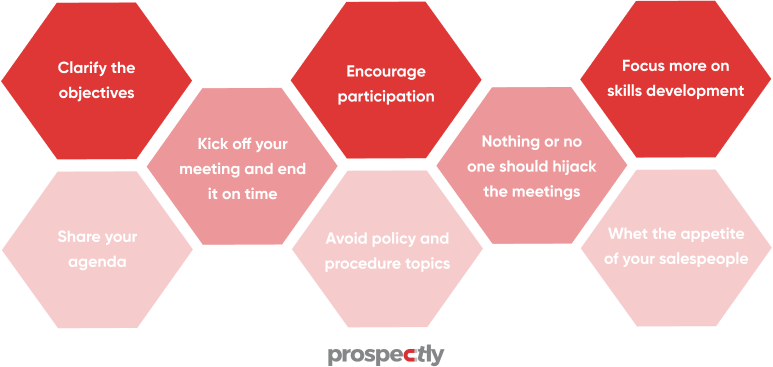
- Clarify the objectives
Everyone needs to know what the meeting will cover to avoid wasting time. Recall the eight things that should form your agenda your session needs to discuss. You can add more items you think are relevant.
- Share your agenda
Use available agenda templates to prepare your meetings. And let every attendee get the schedule in advance by inviting them through a calendar. It gives people who will attend time to prepare and bring ideas to the meeting.
There are many tools you can use to set up your agenda. See an example below.
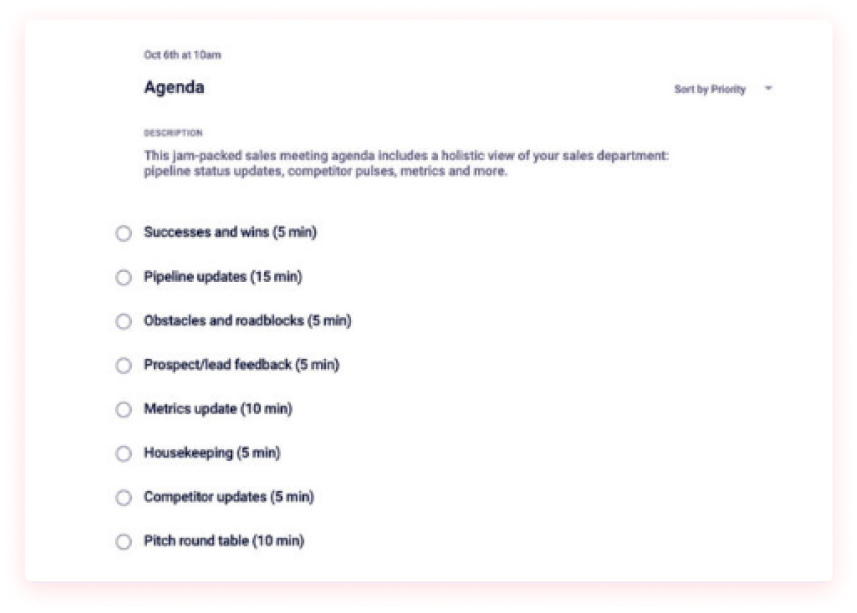
- Kick off your meeting and end it on time
You can see that the above template shows that the meeting lasts for an hour. But the same session can take half an hour. What’s critical here is to start on time and stick to the allocated mins per item for effective sales meetings.
- Encourage participation
A one-sided meeting can bore the attendees to death. But you can kill the boredom through Q&A or brainstorming activities. Ask open-ended questions to keep the communication going.
Can ‘A’ please tell the team how they initiated the first call with a prospect? It’s an open-ended question that’ll trigger an explanation.
Brainstorm topics may include:
– How to improve sales, cold calling, etc.
– How your company can work with other organizations in your industry
– Future goals
- Avoid policy and procedure topics
Remember that the most crucial goal of your sales meeting is for your reps to make more money. That’s what they want to improve after every session. As a result, avoid discussing policy and procedure issues.
If you feel that these matters are essential, organize a separate forum or email your staff to inform everyone about the policy issues.
- Nothing or no one should hijack the meetings
Earlier on, we suggested inviting other relevant departments to your meeting. However, they mustn’t take a huge chunk of your time with your reps. Otherwise, the panel can lose its focus.
Guard your gathering with your sales team jealously. They need your full attention.
- Focus more on skills development
One of your agenda items is sales training. During your team meetings, concentrate on one skill at a time. If it means covering one skill in multiple sessions, let it be so.
You can look at each element in the sale process as a topic. Your training areas could be closing or negotiation, qualifying, sales prospecting, and addressing objections.
Take your time as you want your team to be experts. The more you reinforce the skills, the more you change behaviors.
- Whet the appetite of your salespeople
Your meeting should end on a high note. You can do this by providing salespeople with practical and real-life experiences that apply to their jobs. Tell them that the sales meetings are there to hone their skills to help them make plenty of money.
When they attend the forums, do what you promised. Show them how to do it. You’ll leave them wanting more and looking forward to successful sales meetings.
Sales meetings idea
To stress a previous point, you need to engage your team because it’s the key to the success of your meetings. Everyone needs to participate and air their views and thoughts. Here’s one brilliant idea you can use.
Role Play
You can clarify sales techniques in real-life situations through role-playing.
Show them how to:
- present a sales pitch
- start a conversation with a prospect
- deal with an argumentative client
- handle a hesitant customer, but who’s interested in your product/service
- respond to a client who wants more detailed and specific info about what you offer
- sell to a tech-savvy client
- encourage a buyer who’s afraid to commit
For these sales role-plays to be effective, inform your reps about the scenario well before time. Also, let them use a script, especially when training new hires.
Allow reps to play both the part of a prospect and a salesperson. As a sales manager, you might be tempted to make comments during the role play. It’s not a good idea as it disturbs the flow of communication.
After the presentation, invite comments and ideas on what they can improve. Remind your reps that they’ll face rejection, but they shouldn’t take it personally. Also, emphasize that patience is crucial in selling.
Another crucial aspect is listening to customers to understand their feelings and concerns. As you role-play, test this skill by introducing incorrect info about your product/service. Find out if they noticed the false product details after the activity.
Role-playing can lead to productive sales meetings.
Final Thoughts
A weekly sales meeting is a must-have for all your reps. It helps sales leaders connect with their representatives to instill a sales culture. A clear sales meeting plan with clear objectives is vital. That’s because it ensures that the gathering zeros in on critical matters and sticks to the allocated time.



